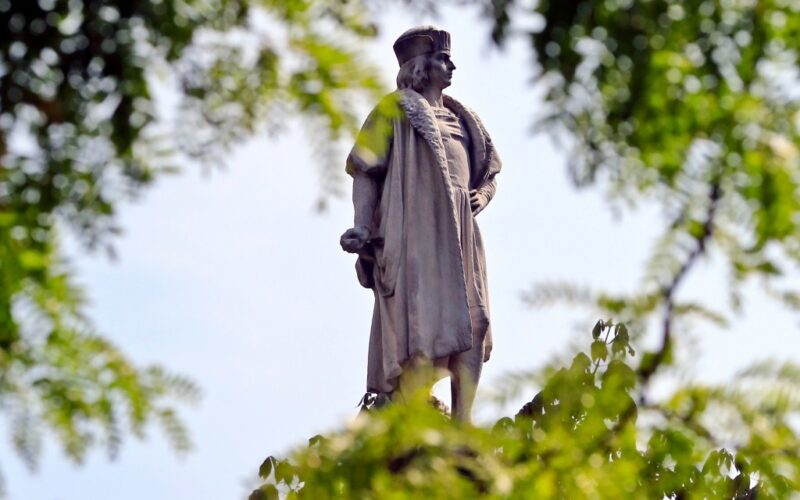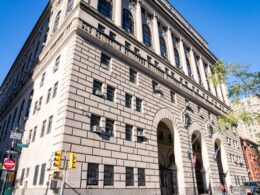In New York City’s volatile 2025 mayoral election, Columbus Day has become a visceral hot-button issue.
Though people of Italian ancestry comprise more than 8% of Gotham’s population, frontrunner Zohran Mamdani cares not a whit about the scions of Italy.
While he has reached out to the Jewish, Hispanic, Black and Muslim communities, the candidate has not been shy about his antipathy to italianità.
In a 2020 tweet, Mamdani called for the immediate removal of the Columbus statue in Astoria. “Take it down!” cried the upstart democratic socialist, vulgarly giving the middle finger to the monument honoring the Admiral of the Ocean Sea.
Is Mamdani even aware that Columbia University — where the candidate’s father, Mahmood Mamdani, serves as the Herbert Lehman Professor of Government — is named after Christopher Columbus?
For all his social media savvy in capturing the Democratic mayoral nomination, Mamdani’s tone-deaf dismissal of one of New York City’s most storied ethnicities may come to haunt him on Nov. 4.
However, in the matter of Cristoforo Colombo, Mamdani’s opponents in the race for Gracie Mansion take different tacks.
Curtis Sliwa, who is generally supportive of Columbus Day, views the federal holiday as a festival celebrating a tumbledown sausage-and-pepper proletariat. Moreover, in his various stints as a radio talk-show host, the founder of the Guardian Angels repeatedly regurgitated, recycled and perpetuated the vile “Godfather”/”Goodfellas”/”Sopranos” stereotype.
When he served as governor of New York, Andrew Cuomo acted decisively to protect the 126-year-old, 76-foot Christopher Columbus monument near Central Park by having the statue listed on both the State and National Registers of Historic Places.
“The Columbus Monument is revered by the Italian-American community in New York and stands as a tribute to the ways our state has welcomed immigrants from around the globe,” declared then-Gov. Cuomo. He further added: “I am proud that we were able to secure this designation, which will help ensure the history of all cultures that make up our uniquely diverse state is always recognized.”
Columbus Day celebrates that unifying Italianate spirit undergirding our republic: “E pluribus unum” — “Out of many, one.”
Genoa’s favorite son, Christopher Columbus, sparked the age of exploration, bringing together two branches of humanity for the first time in recorded history.
And like his fellow Italian explorers — Giovanni da Verrazzano, Amerigo Vespucci, Enrico Tonti and Giovanni Caboto — Cristoforo Colombo was part of a cultural continuum that spawned the Miracle at Philadelphia and the “last best hope of Earth.”
In “The Neverending Empire: The Infinite Impact of Ancient Rome,” Aldo Cazzullo likens Columbus to “a new Aeneas who comes by sea from distant lands” and reaches the Americas.
Then there’s the spiritual dimension to Columbus’ trek, one linking the Admiral of the Ocean Sea to Dante Alighieri, Gioacchino da Fiore — the founder of San Giovanni in Fiore in Calabria — and the Roman poet Virgil.
In “The Divine Comedy,” Dante lauded Gioacchino da Fiore as a prophet for the ages in Canto XII of “Paradiso.” And Columbus, who was steeped in Gioacchino da Fiore’s prophecies, cited him in his “Book of Prophecies” — believing that his voyages were part of divinely ordained expansion of Christianity.
In “Dante, Columbus and the Prophetic Tradition,” Mary Alexandra Watt, an associate professor of Italian Studies and Associate Dean in the College of Liberal Arts and Sciences at the University of Florida, cites Tommaso Stigliani’s epic poem — “Il Mondo Nuovo,” wherein the author depicts a “figural relationship between Aeneas, the founder of pagan Rome, Paul the founder of Christian Rome and Columbus the discoverer of an even greater Christian empire, one that fulfills the Virgilian prophecy of an empire without end in time or space.”
Stigliani “paints Columbus as a new Aeneas expanding Roman dominion, and a new Paul, bringing Christianity to the gentiles.”
This Columbus Day, the New York City mayoral hopefuls would be wise to heed Franklin Delano Roosevelt’s unifying affirmation of Oct. 12, 1940:
“The promise which Columbus’ discovery gave to the world, of a new beginning in the march of human progress, has been in process of fulfillment for four centuries. Our task is now to make strong our conviction that in spite of setbacks that process will go on toward fulfillment.”
Iaconis, chairman of the Italic Institute of America, is writing a novel about Harry S. Truman.








